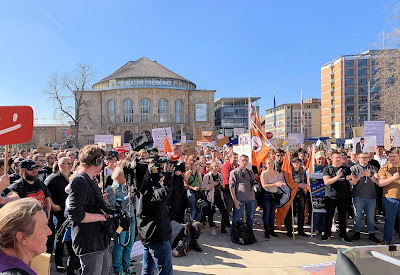In Freiburg they call it
Rottecklinie (the Rotteck line). Last Saturday, the blue line number 5 changed its route deviating at
Heinrich-von-Stephan-Straße from its old route to a new track, crossing the river Dreisam on the rebuilt
Kronenbrücke (crown bridge). The streetcar runs along
Rotteckring (sic!) to end at
Europaplatz (Europe Square). The significant consequence is that the crossing point at
Bertoldsbrunnen is discharged, and the stop
Stadttheater (Municipal Theater) is now the central transfer point where all streetcar lines meet.
With the new line arrangement, Red Baron has an extra benefit for the green line number 2 - I catch at
Lorettostraße - now runs via
Hauptbahnhof (the central train station) to the university hospital center near
Robert-Koch-Straße. This direct connection may come in handy.
 |
| New routing of Freiburg's streetcars (and busses) in the inner city (©VAG) |
Last Saturday, public transport was free in Freiburg, celebrating the new streetcar line. Enthusiasm had no limits when a vintage streetcar affectionately called
Hobel (carpenter's plane) opened a streetcar parade at 12:15 pm.
 |
| ©BZ |
Due to family problems, Red Baron could not participate in the inauguration fest. For my American friends, I took the new route the following day, profiting from the calmness in Germany's cities on Sundays.
I mounted the streetcar number 5 direction
Europaplatz at
Heinrich-von-Stephan-Straße or rather stepped into the streetcar, for platform and entry on most lines are now at the same level. However, low-floor is a disadvantage of the streetcar type below made by Siemens. The interior noise level is uncomfortably high for the insulation between the motors, and the floor is thin.
On foot, I crossed the new bridge over the Dreisam with the river presently living up to its name, "the rapid flowing." The newly arranged riverside path on the right is a fast bicycle lane, while the one on the left is reserved for pedestrians. In the back, you may distinguish the riverside restaurant. Further to the right (and left) runs the four-lane federal highway 31 through Freiburg, waiting for a tunnel to be built by 2030 (?). The round traffic sign on the right stands for the new anti-air pollution speed limit of 30 km per hour (18.6 miles per hour).*
*Click the photos to enlarge
Here, we look back to the bridge carrying just one Sunday car and two cyclists. The blue mark on the street on the left reads
Fahrradstraße, meaning that from here on, cyclists have priority.
Here we are looking from the stop
Erbprinzenstraße (Heir to Throne Street) in the direction of the university. You will note that line 5 passes through the campus with the diamond of the new university library on the left and the main building made from red sandstone on the right. Daffodils are growing on the flank of the
mensa* hill, being a remnant of the
Vauban fortifications.
*University cafeteria
On the other side of the
Stadttheater stop, the redesigned
Colombi Park - with the
Schlössle (small castle) of the same name housing Freiburg's Museum of Archeology in the back - now looks more spacious than before. Note the many bicycles on
Rotteckring on a Sunday afternoon.
On my way home, I had the comfort of one of the newly acquired URBOS streetcars made by the Spanish firm CAF. They are not only looking elegant, but above all, they are silent.
I stepped off at
Heinrich-von-Stephan-Straße and walked home. When I passed
Kaisers Gute Backstube (Kaiser's good baking room), I felt like having deserved a reward. I settled for a pot of coffee, a piece of Raspberry Baiser, and a most delicious apple-walnut* pie.
*Worth a detour
 |
| Note the menu card is in English only. |
*












































